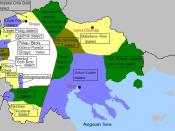Speech is a significant factor that makes up a person's sense of identity. Many poets have wrote about their own and other people's dialect and language. They use the ideas of different cultures and traditions to highlight the fact that some people are wrongly treated differently because of independent qualities like their language. The poets Liz Lockhead, John Agard, Tom Leonard and Sujata Bhatt all express how differences in language collide, or eat up inside them. They believe that you are not yourself until you are true to your speech and accent. Some people take language as an asset, the little extra they didn't ask for. They wouldn't mind if it changed because it doesn't change their personality. Others disagree and argue other people might think of them in a different way if they had an altered accent or dialect. But most people agree on one thing, you can't choose they way you speak, it almost chooses you, and all you can do is enjoy it, just go along with it, or drastically change it.
It's about pride, whether or not you are proud of it, or just don't care and the poets show they definitely care about theirs.
Sometimes poets play around with Standard English, again like in English is a crazy language with play on words. There are many reasons for this, among them being that they were showing it's not so perfect, that it has flaws just like everything else. Like in English is a Crazy Language, McCullough says "sweetmeats aren't candies while sweetbreads aren't sweet are meat" which is a tongue twister as well as a play on words. Sometimes poets also mix Standard English with something else to show a comparison. Like in Kids Poem, Lockhead shows the Scottish accent, and follows it meaning...


